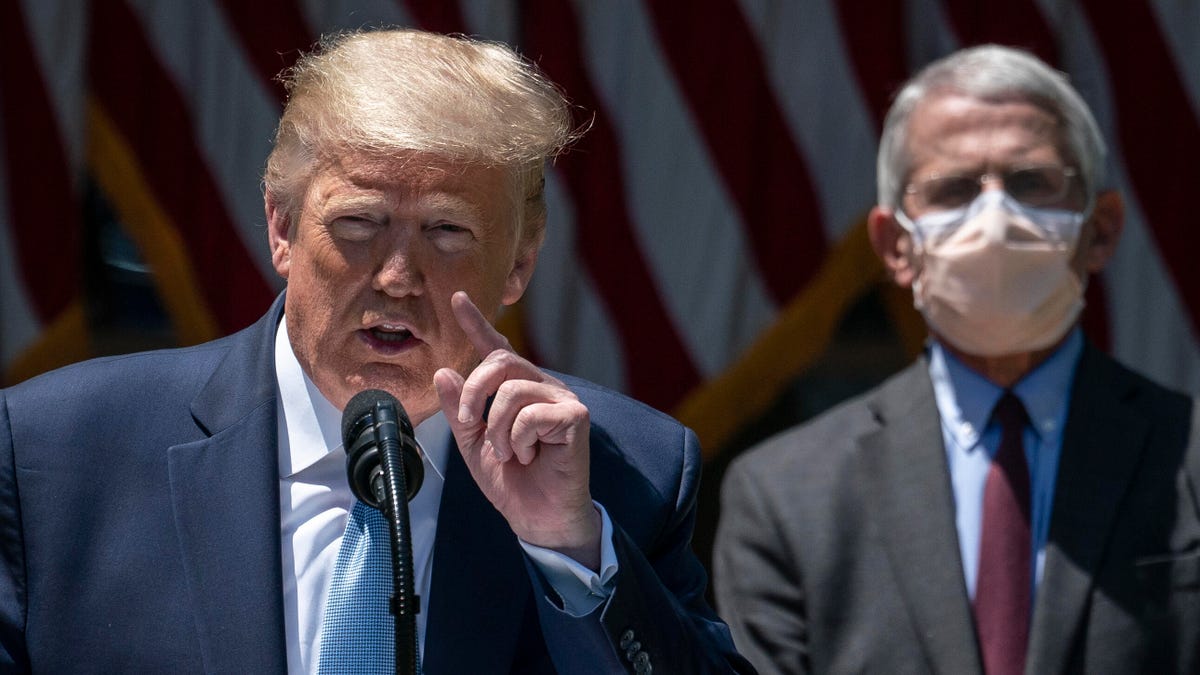Trump says he's taking controversial COVID-19 drug hydroxychloroquine
The US president says he's taking a pill every day, despite a lack of evidence for taking hydroxychloroquine as a preventative.

President Donald Trump says he's taking a controversial drug to prevent contracting COVID-19.
US President Donald Trump says he's been taking hydroxychloroquine, a controversial anti-malarial drug touted as a potential COVID-19 treatment, for "about a week and a half," despite a lack of evidence it can prevent coronavirus infection.
The Food and Drug Administration has granted the drug, which is also used to treat conditions like lupus and rheumatoid arthritis, emergency use authorization status, allowing it to be given to patients with COVID-19 in clinical trials or hospital settings. However, the FDA cautions against its use outside of these circumstances because it has been known to cause heart rhythm problems. Taking hydroxychloroquine as a preventative for COVID-19 isn't covered by the FDA's emergency use authorization policy.
During a White House briefing on Monday, Trump discussed the treatment noting "many, many" frontline workers were taking the drug, before stating "I happen to be taking it." When a reporter asked why, Trump said "because I think it's good, I've heard a lot of good stories." He clarified he's taking both zinc and hydroxychloroquine and said he hasn't been exposed to COVID-19.
Coronavirus updates
When asked if the treatment was recommended by the White House doctor, Trump said "yeah, White House doctor, didn't recommend -- no, I asked him "what do you think?" He said, "well, if you'd like it." I said, "yeah, I'd like to take it.'
"A lot of people are taking it, a lot of front line workers are taking hydroxychloroquine," he said. "There's a very good chance this has an impact, especially early on."
Trump has long championed the potential of hydroxychloroquine when taken with azithromycin, an antibiotic, tweeting in March that the combination treatment had a "real chance to be one of the biggest game changers in the history of medicine."
HYDROXYCHLOROQUINE & AZITHROMYCIN, taken together, have a real chance to be one of the biggest game changers in the history of medicine. The FDA has moved mountains - Thank You! Hopefully they will BOTH (H works better with A, International Journal of Antimicrobial Agents).....
— Donald J. Trump (@realDonaldTrump) March 21, 2020
A memorandum from the president's physician on Monday clarified the statements made by Trump, explaining "after numerous discussions he and I had regarding the evidence for and against the use of hydroxychloroquine, we concluded the benefit from treatment outweighed the relative risks."
The weight of scientific evidence currently suggests COVID-19 patients don't see improved clinical outcomes on hydroxychloroquine. Studies have shown increases in mortality and combination studies, with azithromycin, also failed to show benefits. Adverse events are also more common on those receiving the drug. There's a varied clinical picture for COVID-19 patients, with symptoms ranging from mild to severe, and adequately assessing the effect of hydroxychloroquine requires trialing it in multiple patient populations.
Gaetan Burgio, a geneticist and infectious disease expert at Australian National University, has been following the clinical data being published about hydroxychloroquine and says "there is now a increasing body of evidence demonstrating hydroxychloroquine does not offer efficacy for protection against COVID-19 prophylactically and curatively."
In regards to Trump, he notes "there is no evidence it will protect him against COVID-19."
Researchers are still looking to understand how hydroxychloroquine in combination with azithromycin and zinc may benefit patients with COVID-19. There are more than 160 hydroxychloroquine trials ongoing, with the majority assessing the effects of the drug in battling COVID-19 infection, according to the National Institutes of Health's clinical trial website. Only a handful of these studies are assessing the effects of the drug as a prophylactic. A systematic review, published in the International Journal of Rheumatic Diseases in April, suggested there is a "dearth of evidence" to support its use as a preventative treatment option.

